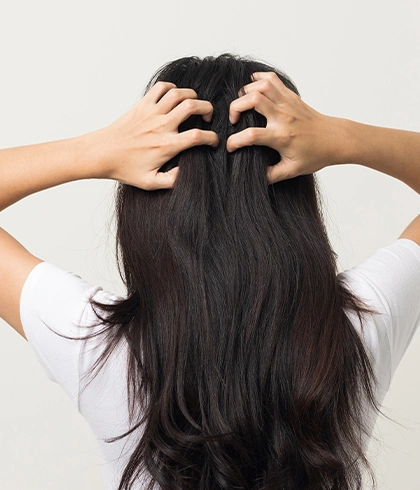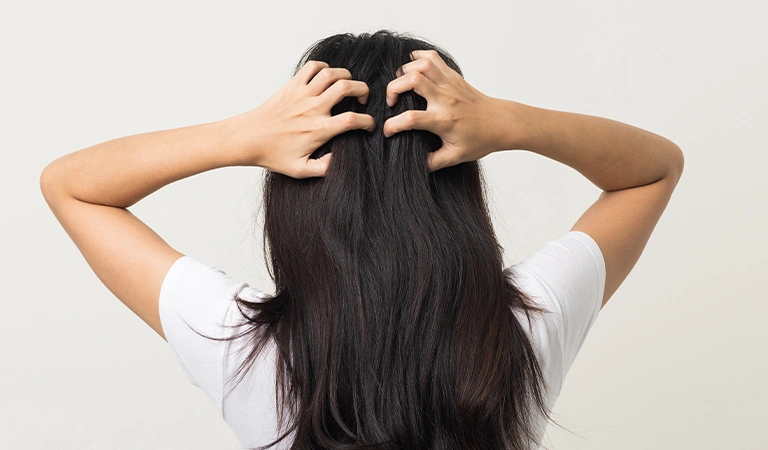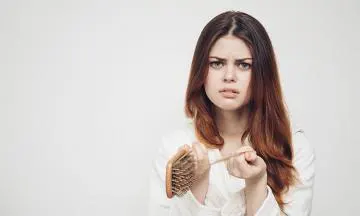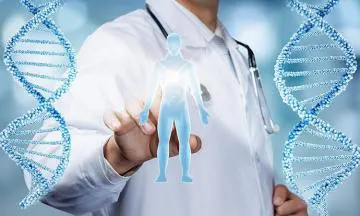

Is an Itchy Scalp Causing Your Hair Loss? Here’s What You Need to Know
The health of your scalp plays a crucial role in the overall condition of your hair. A healthy scalp provides the ideal environment for hair follicles to grow strong, resilient strands. However, when the scalp becomes irritated or inflamed, it can lead to a host of problems, including hair loss.
An itchy scalp is not only uncomfortable but can also be a sign of underlying issues that, if left untreated, could affect your hair health.
This article explores the connection between an itchy scalp and hair loss, common causes, and effective ways to address the issue.
The Connection Between Scalp Health and Hair Loss
A healthy scalp is essential for optimal hair growth. Just like the skin on the rest of your body, your scalp is prone to a variety of conditions that can disrupt hair follicles. When the scalp experiences issues like inflammation, dryness, or infection, hair growth can be stunted, and the hair follicles can become weak. This leads to hair thinning, shedding, and, in some cases, permanent hair loss.
An itchy scalp is often the first warning sign that something is wrong. While it may start as a mild irritation, if ignored, it can escalate into a more severe condition that damages hair follicles and leads to hair loss. It’s essential to understand that scratching an itchy scalp might seem like a temporary relief, but it can cause further harm by worsening inflammation and weakening hair roots.
Can an Itchy Scalp Really Lead to Hair Loss?
Yes, an itchy scalp can indeed lead to hair loss, but the process is gradual and often a result of continued irritation. Here’s how constant itching can damage hair follicles and contribute to hair shedding:
The Vicious Cycle: Scratching → Inflammation → Weak Hair Roots → Hair Fall
When your scalp becomes itchy, you’re likely to scratch it. This might provide temporary relief but also creates friction on the scalp. Constant scratching can damage the delicate skin on your scalp, leading to micro-injuries and inflammation. As inflammation increases, it weakens the hair follicles, making it difficult for them to hold onto the hair. Weak follicles can cause hair to shed prematurely.
In severe cases, ongoing scratching and inflammation can lead to scarring of the scalp, a condition known as scarring alopecia. Once the hair follicles are scarred, they may no longer produce hair, leading to permanent hair loss.
Why Ignoring an Itchy Scalp Can Worsen the Problem
If you continue to ignore an itchy scalp or rely on quick fixes (like scratching or using harsh products), you risk worsening the underlying issue. For example, an untreated scalp condition like dandruff or eczema can become chronic and more difficult to manage over time.
This can not only lead to more severe hair loss but may also make the scalp more vulnerable to infections. The longer you leave it untreated, the more difficult it may become to reverse the damage.
Common Causes of an Itchy Scalp and Hair Loss
There are several potential causes of an itchy scalp, and each one may contribute to hair loss in different ways. Understanding the root cause is crucial to addressing both the itching and the hair loss.
Scalp Conditions
- Dandruff (Seborrheic Dermatitis):
Dandruff is one of the most common causes of an itchy scalp. It’s a condition where the scalp produces excess oil, leading to flaking and itching.
These flakes can cause irritation and inflammation, which, over time, weakens hair follicles and leads to hair shedding. In severe cases, untreated dandruff can result in noticeable hair thinning and hair loss.
Also Read - Dandruff Treatment
- Psoriasis:
Psoriasis is a chronic autoimmune condition that causes scaly, red patches on the skin, including the scalp. These plaques can cause intense itching and inflammation. The inflammation can damage hair follicles and disrupt the normal growth cycle of hair, leading to thinning and shedding.
- Eczema:
Eczema, also known as atopic dermatitis, is an inflammatory skin condition that causes itching, redness, and dryness. When eczema affects the scalp, it can cause the skin to crack and become inflamed, leading to hair loss. Scratching the itchy patches can further irritate the scalp, making the condition worse.
Fungal and Bacterial Infections
- Ringworm (Tinea Capitis): Ringworm is a fungal infection that causes red, itchy patches on the scalp. It can also cause hair to fall out in round patches, resulting in noticeable bald spots. The infection weakens hair follicles, preventing hair from growing properly.
- Folliculitis: Folliculitis is the inflammation of hair follicles, usually caused by bacterial infections. It can lead to itchy, painful bumps on the scalp, which can eventually lead to hair loss if left untreated. The inflammation damages the hair follicles and can cause them to become clogged, preventing hair from growing effectively.
Lifestyle and Environmental Triggers
- Harsh Shampoos and Chemicals:
Many shampoos, conditioners, and styling products contain chemicals that strip the scalp of its natural oils. These harsh chemicals can cause the scalp to dry out, leading to irritation and itching.
In addition, some people may be sensitive to certain ingredients in these products, which can cause allergic reactions that lead to itching and hair loss.
- Stress and Diet:
Both stress and diet can have a significant impact on scalp health. Chronic stress can trigger hormonal imbalances that worsen scalp issues like dandruff, eczema, or psoriasis.
Meanwhile, a poor diet lacking essential nutrients like vitamins, minerals, and fatty acids can weaken hair follicles, making them more prone to damage and hair loss.
Other Causes
- Hormonal Changes or Imbalances:
Hormonal fluctuations—such as those experienced during pregnancy, menopause, or due to thyroid issues—can also contribute to scalp irritation and hair loss. Hormonal changes can lead to an overproduction of oil or cause the scalp to become dry and flaky, leading to itching.
- Allergies to Hair Care Products:
Some people develop allergies or sensitivities to certain ingredients found in hair care products, such as fragrances, dyes, or preservatives. These allergens can irritate the scalp, causing itching, redness, and even hair loss in some cases.
How to Address an Itchy Scalp and Prevent Hair Loss
If you're dealing with an itchy scalp and want to prevent it from leading to hair loss, it’s important to take the right steps to soothe your scalp and treat the underlying cause.
Here’s how you can manage your itchy scalp and promote healthy hair growth:
- Stop Scratching:
While scratching may provide temporary relief, it can worsen the situation in the long run. Instead of scratching, gently massage your scalp with your fingertips to help alleviate irritation and improve blood circulation.
- Use Mild, Sulfate-Free Shampoos:
Sulfates and harsh chemicals can strip the scalp of its natural oils, making it more prone to dryness and irritation. Look for mild, sulfate-free shampoos that cleanse without causing further damage.
- Moisturize and Hydrate:
Keeping the scalp moisturized is essential to prevent dryness and itching. Look for natural, hydrating scalp treatments that help restore balance to your scalp without causing further irritation.
When to Seek Professional Help
If home remedies and over-the-counter products don’t seem to help, or if the problem persists, it’s important to consult a healthcare provider or dermatologist. You should seek professional help if:
- The itching persists despite using gentle products and home remedies.
- You notice significant hair thinning or patchy hair loss.
- Your scalp becomes inflamed, swollen, or shows signs of infection (such as pus-filled bumps).
A healthcare professional can help diagnose the root cause of your itchy scalp and suggest more targeted treatments.
How Homeopathy Can Help Treat Itchy Scalp and Hair Loss
Homeopathy offers a natural approach to treating an itchy scalp and hair loss. By addressing the underlying causes of scalp irritation—whether it’s an allergic reaction, fungal infection, or hormonal imbalance—homeopathic remedies can help restore balance to the body and alleviate symptoms.
Homeopathic treatments are often personalized, considering your unique symptoms and overall health. These remedies can reduce inflammation, promote healing, and support the hair growth process without the use of harsh chemicals.
Expert Care at Dr Batra’s Clinics in UAE
If you're struggling with an itchy scalp and hair loss, Dr Batra’s Homeopathy Clinics in UAE offer expert care and personalized treatment plans to address your concerns.
With a holistic approach to scalp and hair health, Dr Batra’s team combines traditional medicine with homeopathy to create tailored solutions for long-term relief. Whether you have dandruff, psoriasis, or another scalp condition, professional guidance and treatment can help you regain control over your scalp and hair health.
Conclusion
An itchy scalp is not something to be ignored, especially if it’s affecting your hair health. The longer you wait to address the issue, the more likely it is to contribute to hair loss.
Understanding the root causes of scalp irritation and taking immediate action to soothe your scalp can help prevent further damage. From using gentle, hydrating products to seeking professional help when needed, there are many ways to manage an itchy scalp and promote healthy hair growth.
If the issue persists or worsens, consider consulting with a healthcare provider or exploring homeopathic remedies for natural, long-term relief. The key is to act early, before the irritation leads to irreversible hair loss.




